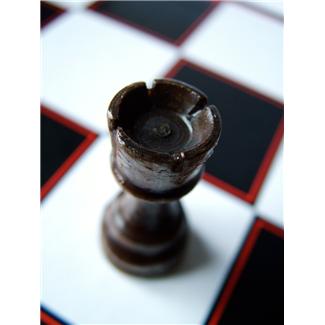Checkmate and the Remaining Game in Libya
Qaddafi's demise calls for measured celebration. But the uphill climb has only just begin.

It is not hard to see the reasons for celebrating the end of the line for has-been leaders. One is satisfaction, rooted in a sense of either justice or revenge, in seeing a bad person get his due. Another reason is the tendency to view conflicts as if there were some critical nub, the status of which determines the outcome of the contest—just as checkmating the king determines the outcome of a game of chess. NATO and the rebels in Surt have finally checkmated Qaddafi.
The emphasis placed on the fate of an already deposed leader, however, including one deposed as a result of a lost war or military intervention, overlooks that very few such leaders have the skill, charisma and luck to have any chance of again having a significant effect on world affairs. Napoleon Bonaparte was one of the few. After he busted out of the scene of his first exile, Elba, it took the Duke of Wellington, Marshal Blucher and a lot of troops at Waterloo to put him out of business once and for all. In contrast, Saddam Hussein in the spider hole wasn't having any effect worth mentioning on the course of events in post-Saddam Iraq, or any real hope of having such an effect. As for Qaddafi, his death hardly makes a difference for the course of events in Libya over the coming months.
Let Libyans celebrate the ex-dictator's demise anyway; they've earned the right to do so. For those of us outside Libya, the intense focus on what just happened at Surt is harmless if it is used as a peg for analysis of the tasks still ahead in Libya. Much of the commentary in the first twenty-four hours after the event has tried to do so, with comments focused on, “now the real work begins.” The only thing wrong with that kind of comment is that the real work in forging a post-Qaddafi Libya actually began at least a couple of months ago. More detrimental is the use of the ex-dictator's death as a way to score the policy or performance of our own leaders. Such scoring is happening right now. But whatever is good about President Obama's policy toward Libya would have been good even if Qaddafi had not died this week, and whatever is bad about it is still bad despite the death.
Excessive celebration of this one event risks detracting attention from the magnitude and difficulty of the task that Libyans face in building a new national order. It also risks accentuating the disappointment and disillusionment resulting from the difficulties encountered in that task. Look at how much disillusionment there is next door in Egypt today, eight months after Hosni Mubarak was ousted. Libyans, unlike Egyptians, do not face an entrenched military left over from the old regime. But they face an even greater adversary in the form of the atomized, almost insitutionless society and politics left by Qaddafi, making it doubly hard to provide the essential services of government and to resolve the inevitable conflicts of interest that will become increasingly apparent in Libya.
